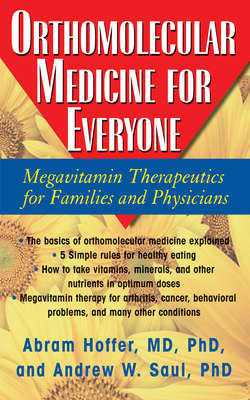Читать книгу Orthomolecular Medicine for Everyone - Abram Hoffer M.D. Ph.D. - Страница 46
На сайте Литреса книга снята с продажи.
SOME CRITICAL PERSPECTIVE
ОглавлениеSupplementation’s harshest critics have traditionally railed against vitamins (especially in large doses) as being outright “dangerous” or at the very least “a waste of money.” Yet, nutritional supplements are very safe, and for much of the population, very necessary. When the Journal of the American Medical Association published the recommendation that every person take a multivitamin daily, they stated that “suboptimal intake of some vitamins, above levels causing classic vitamin deficiency, is a risk factor for chronic diseases and common in the general population, especially the elderly.”19 Therefore, the intent of JAMA goes beyond routine nutritional insurance for widespread bad-to-borderline diets. The goal is stated in the article’s title: “Vitamins for Chronic Disease Prevention in Adults.” It is a sensible idea whose time should have come generations ago.
To illustrate how extraordinarily important supplements are to persons with a questionable diet, consider this: children who eat hot dogs once a week double their risk of a brain tumor. Kids eating more than twelve hot dogs a month (three hot dogs a week) have nearly ten times the risk of leukemia as children who ate none.20 However, hot dog–eating children taking supplemental vitamins were shown to have a reduced risk of cancer.21
It is curious that, while theorizing many “potential” dangers of vitamins, the media often choose to ignore the very real cancer-prevention benefits of supplementation. Critics also fail to point out how economical supplements are. For low-income households, taking a 2-cent vitamin C tablet and a 5-cent multivitamin, readily obtainable from any discount store, is vastly cheaper than getting those vitamins by eating right. The uncomfortable truth is that it is often less expensive to supplement than to buy nutritious food, especially outof-season fresh produce.
As many as 300,000 Americans die annually from poor nutritional choices. Supplements make any dietary lifestyle, whether good or bad, significantly better. Supplements are an easy, practical better nutrition solution for the public. A television-educated populace is more likely to take some tablets than to willingly eat organ meats, wheat germ, bean sprouts, and ample vegetables. Media supplement scare stories notwithstanding, taking supplements is not the problem—it is a solution. Malnutrition is the problem.22
STRONG PUBLIC SUPPORT FOR NUTRITIONAL SUPPLEMENTS
A recent (March 26, 2003) and unsuccessful attempt to restrict free public access to vitamin supplements was U.S. Senate Bill S. 722, the “Dietary Supplement Safety Act of 2003.” The proposed law attempted to give the head of the U.S. Food and Drug Administration sole power to decide if and when “the continued marketing of the dietary supplement is disapproved,” based on adverse event reporting so vague that the proposed bill specified that the decision was “without regard to whether the event is known to be causally related to the dietary supplement.”
The intent of S. 722 was to overturn the main provisions of the U.S. Dietary Supplement Health and Education Act of 1994 (DSHEA). The U.S. Congress enacted DSHEA specifically to define vitamins, amino acids, herbs, and other nutritional supplements as foods, not drugs. DSHEA enjoyed tremendous popular support. More citizen letters—2.5 million—were sent to Congress in 1992–1994 in favor of DSHEA than over any other issue in American history. Citizen opposition to S. 722 was also strong. It gathered only four co-sponsors, and failed in committee. The Congress has seen that there is overwhelming public support for ensuring free access to dietary supplements.
